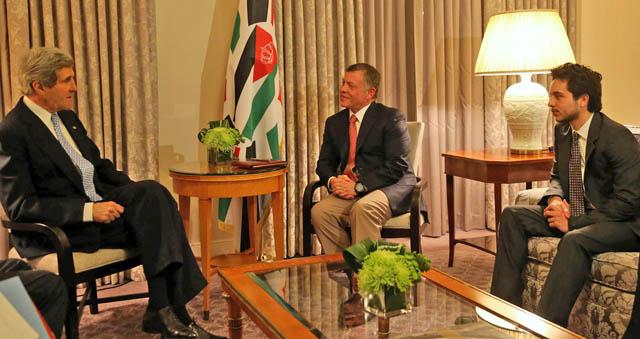AMMAN — Prime Minister Abdullah Ensour on Tuesday concluded a two-day visit to Egypt, where he held talks with Egyptian leaders that focused on bilateral ties and latest regional developments.
Meanwhile, the meetings of the joint higher committee ended with signing agreements in several fields and announcements of mega-projects on the drawing board, including a railway project that connects the two countries and Gulf states.
During a meeting with interim President Adli Mansour, Ensour stressed the “deep-rooted” Jordanian-Egyptian relations in all fields, expressing keenness on enhancing them to serve the interests of the people of the two countries, the Jordan News Agency, Petra, reported.
Conveying greetings of His Majesty King Abdullah to Mansour, Ensour also renewed Jordan’s support to Egypt during the “critical circumstances it is currently going through”.
For his part, Mansour voiced his country’s keenness on building solid partnership with the Kingdom in all fields.
In their discussions of the latest regional developments, especially the situation in Syria and the peace process, the two sides stressed the need for a political solution to the Syrian crisis and a comprehensive settlement of the Palestinian question that leads to the establishment of an independent Palestinian state.
The meeting was attended by Minister of Higher Education Amin Mahmoud, Minister of Industry, Trade and Supply Hatem Halawani, Jordan’s Ambassador to Egypt Bisher Khasawneh in addition to Egypt’s interim Prime Minister Hazem Beblawi.
Also on Tuesday, Ensour held talks with Egypt’s military chief, first deputy premier and defence minister Field Marshal Abdel Fattah Al Sisi that also focused on bilateral ties and regional developments.
During the meeting, Ensour reiterated Jordan’s support for Egypt, expressing confidence in Egypt’s capability to overcome the current challenges and restore its leading role in the Arab world.
For his part, Sisi expressed gratitude for Jordan and His Majesty for supporting Egypt, underlying historic Jordanian-Egyptian relations.
Also on Tuesday, Ensour and Beblawi presided over the 24th session of the Joint Higher Jordanian-Egyptian Committee, stressing the need to increase the volume of joint investments and trade exchanges between the two countries that amounted to around $2 million.
Following the meeting, the two countries signed a number of memorandums of understanding and executive programmes in the fields of vocational training, water, social development, tourism and youth empowerment.
During a joint press conference following the meeting, Ensour pointed to the existing possibility to bolster the trade exchange between the two countries, citing the Kingdom’s geographical location as a link between Egypt and Asian Arab states, mainly Iraq and Syria.
Ensour also stressed the importance of a railway between Jordan, Egypt and Gulf states, again saying that Jordan can serve as Egypt’s gateway to Europe and oil-rich Arab countries.
Responding to a question about Egyptian gas, Ensour said: “We are aware of the situation in Egypt and they [Egyptians] are aware of our situation in Jordan… There could be further cooperation between Jordan and Egypt beyond the joint accords signed between the two countries. Egypt is to begin gas mega-projects and Jordan has already commenced implementing a natural gas terminal that is expected to be completed by the end of this year to import and store liquefied gas. Egypt then can export its surplus gas from Jordan.”
Ensour also said that there are 500,000 to 750,000 Egyptian guest workers in various sectors, adding that they are given special treatment in the Kingdom.
Beblawi commended Jordan’s treatment of Egyptian guest workers who enjoy all forms of insurance and protection.
On the gas issue, Beblawi said that Egypt faces difficulties in fuel and has suffered from imbalances in the energy sector, adding that the two countries are determined to boost joint cooperation in all fields.











